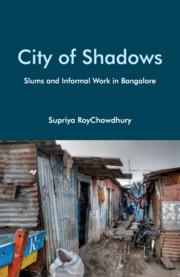Book contents
- Frontmatter
- Contents
- List of Tables
- Acknowledgements
- 1 Introduction
- 2 Welfare and Work: State Autonomy Revisited
- 3 Urban Poverty and Informal Work
- 4 A Political Economy Overview: Karnataka and Bangalore
- 5 New Slums: Migration, Livelihoods and Living
- 6 Old Slums
- 7 Impact of Slum Housing Policies: Bangalore’s New Ghettoes
- 8 Women Workers in Bangalore’s Garment Export Companies
- 9 Conclusion
- Index
6 - Old Slums
Published online by Cambridge University Press: 31 July 2021
- Frontmatter
- Contents
- List of Tables
- Acknowledgements
- 1 Introduction
- 2 Welfare and Work: State Autonomy Revisited
- 3 Urban Poverty and Informal Work
- 4 A Political Economy Overview: Karnataka and Bangalore
- 5 New Slums: Migration, Livelihoods and Living
- 6 Old Slums
- 7 Impact of Slum Housing Policies: Bangalore’s New Ghettoes
- 8 Women Workers in Bangalore’s Garment Export Companies
- 9 Conclusion
- Index
Summary
Cities of the Global South have witnessed the emergence of a newly affluent, highly mobile upper class, dramatic changes in consumption patterns, rapidly changing information and communication channels, and the exclusion of some from these processes. Disparities are hardly new to cities in developing countries, anchored as they are in highly unequal structures shaped by the privileged access of elite castes and communities, in traditional societies, to learning and increasingly to professional skills and other resources. Social and economic exclusions were structured into this urban framework where manual, unskilled work was performed by lower castes and underprivileged communities. In the current era, however, urban inequalities have a different face. As cities become sites of spectacular wealth and consumption, the widening chasm between those who can access the benefits of global marketisation and those who remain on the margins, or are in structurally disadvantageous positions within it, becomes starker. Many cities of the developing world are caught within these sharply emerging contradictions of wealth and deprivation.
These contradictions are blatantly visible in Bangalore. Bangalore's rapid economic rise, riding on the IT revolution and a facilitating policy environment for private capital, both domestic and foreign, has been discussed in Chapter 3. While this growth trajectory has brought some opportunities to a few sections of the urban lower classes in Bangalore, there is as yet no substantive analysis of the precise nature of these opportunities, and, more importantly, whether these translate to increased access to economic and social resources for the urban poor and their progeny. The questions examined in this chapter are: What happens to the urban poor in a context of rapid economic growth of the city? What are the channels through which the urban underclass get drawn into the city's growing economy? What are the modalities of inclusion and exclusion?
The decline of large state-owned manufacturing industries and of the SSI sector frames Bangalore's political economy of the last few decades. With the folding up of factory jobs, unskilled workers are employed predominantly in he construction industry and in the lower rungs of the service sector. In what ways do these macro features reflect in the lives and livelihoods of slum dwellers?
This chapter is about inner-city slums, where most people were found to work in casual wage employment, self-employment in petty trade, or as salaried workers in services.
- Type
- Chapter
- Information
- City of ShadowsSlums and Informal Work in Bangalore, pp. 122 - 148Publisher: Cambridge University PressPrint publication year: 2021



